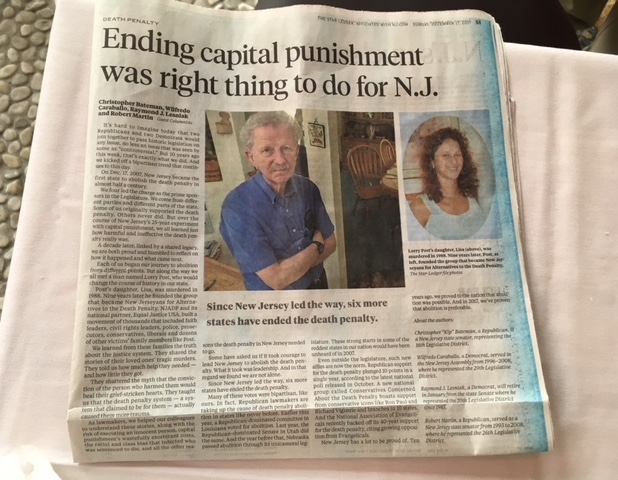
Published with the permission of The Star-Ledger, where it first appeared.
It’s hard to imagine today that two Republicans and two Democrats would join together to pass historic legislation on any issue, no less an issue that was seen by some as “controversial.” But ten years ago this week, that’s exactly what we did. And we kicked off a bipartisan trend that continues to this day.
On December 17, 2007, New Jersey became the first state to abolish the death penalty in almost half a century. We four led the charge as the prime sponsors in the legislature. We come from different parties and different parts of the state. Some of us originally supported the death penalty. Others never did. But over the course of New Jersey’s 25-year experiment with capital punishment, we all learned just how harmful and ineffective the death penalty really was.
Ten years later, linked by a shared legacy, we are both proud and humbled to reflect on how it happened and what came next.
Each of us began our journey to abolition from different points. But along the way we all met a man named Lorry Post who would change the course of history in our state. Lorry’s daughter Lisa was murdered in 1988. Nine years later he founded the group that became New Jerseyans for Alternatives to the Death Penalty. NJADP and its national partner, Equal Justice USA, built a movement of thousands that included faith leaders, civil rights leaders, police, prosecutors, conservatives, liberals, and dozens of other victims’ family members like Lorry.
We learned from these families the truth about the justice system. They shared the stories of their loved ones’ tragic murders. They told us how much help they needed – and how little they got. They shattered the myth that the conviction of the person who harmed them would heal their grief-stricken hearts. They taught us that the death penalty system – a system that claimed to be for them – actually caused them more trauma.
As lawmakers, we helped our colleagues to understand these stories, along with the risk of executing an innocent person, capital punishment’s wastefully exorbitant costs, the racial and class bias that infected who was sentenced to die, and all the other reasons the death penalty in New Jersey needed to go.
Some have asked us if it took courage to lead New Jersey to abolish the death penalty. What it took was leadership. And in that regard we found we are not alone.
Since New Jersey led the way, six more states have ended the death penalty. Many of these votes were bi-partisan, like ours. In fact, Republican lawmakers are taking up the cause of death penalty abolition in states like never before. Earlier this year, a Republican-dominated committee in Louisiana voted for abolition. Last year, the Republican-dominated Senate in Utah did the same. And the year before that, Nebraska passed abolition through its unicameral legislature. These strong starts in some of the reddest states in our nation would have been unheard of ten years ago.
Even outside the legislature, such new allies are now the norm. Republican support for the death penalty plunged ten points in a single year, according to the latest national poll released in October. A new national group called Conservatives Concerned About the Death Penalty boasts support from conservative icons like Ron Paul and Richard Viguerie and branches in ten states. And the National Association of Evangelicals recently backed off of its 40-year support for the death penalty, citing growing opposition from Evangelicals.
New Jersey has a lot to be proud of. Ten years ago, we proved to the nation that abolition was possible. And ten years later, we’ve proven that abolition is preferable.
About the authors:
Christopher “Kip” Bateman, a Republican, is a New Jersey state senator, representing the 16th Legislative District.
Wilfredo Caraballo, a Democrat, served in the New Jersey Assembly from 1996-2008, where he represented the 29th Legislative District.
Raymond J. Lesniak, a Democrat, will retire in January from the state Senate, where he represented the 20th Legislative District since 1983.
Robert Martin, a Republican, served as a New Jersey state senator from 1993 to 2008, where he represented the 26th Legislative District.


